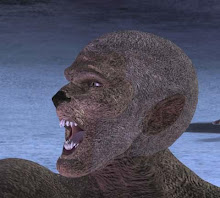History Channel - Original Air Date: 9/24/08
Are bear attacks becoming more frequent? Are bears becoming larger? MQ looks into a recent series of bear events -- searching for a gigantic version of a known creature, rather than a cryptid. As with many of these MQ programs, the show suggests that perhaps the giant bears are survivors of a bygone era. (Many animals had larger ancestors during the ice age.) Scientist John Hechtel suggest that natural variations and desires for "a campfire boogyman" may explain rumors of giants. Remains of a giant bear shot 100 or so years ago, McFarlane's Bear, are in the Smithsonian; the original, examining scientist thought the skeleton something odd. Is it the last remains of the giant short-faced bear? A hunter in Alaska shot a bear that stood 11 feet tall and weighed 1200 pounds and had 12-inch paws. MQ sends people to the Kenai peninsula in Alaska to look for large and unusual-looking bears. But bears are not limited to Alaska. In Lake Wanda, NJ (45 minutes from Manhattan), bears are encroaching on human habitat.
There are eight types of bears in the world, but John Martel recently shot a polar bear-grizzly hybrid. Could there be other such hybrids, and could they be responsible for freakish bear reports? An interesting discussion of bear evolution follows. Then more speculation about hybrids roaming to the edge fo the grizzly's range, in Wyoming. Yet another hunter shoots a polar bear-like animal 250 miles inland -- ten times further inland than the range of the usual polar bear. Could this be another hybrid? Native legends tell of huge bears large enough to swallow a man. The MQ team sets up a camp surrounded by an electric fence; they're not taking chances in bear territory. They also put up audio alarm motion detectors. And, what would any MQ show be without photo traps? They hope to gauge incoming bears' heights with a trap with baits at increasing heights. Of course, the traps catch nothing unusual. If confronting a bear, experts recommend pepper spray. (Also playing dead -- fighting only if you must. Big guns work, too.) The McFarlane's Bear turns to be only a brown, and not a particularly big one at that. The land-bound white bear turns out to be a pure polar bear, way off it's range. And so we end up with another show filled with sensational speculation, eyewitness stories, and no scientific or cryptid breakthroughs. Too bad they can't do a show called MonstersFound.
Are bear attacks becoming more frequent? Are bears becoming larger? MQ looks into a recent series of bear events -- searching for a gigantic version of a known creature, rather than a cryptid. As with many of these MQ programs, the show suggests that perhaps the giant bears are survivors of a bygone era. (Many animals had larger ancestors during the ice age.) Scientist John Hechtel suggest that natural variations and desires for "a campfire boogyman" may explain rumors of giants. Remains of a giant bear shot 100 or so years ago, McFarlane's Bear, are in the Smithsonian; the original, examining scientist thought the skeleton something odd. Is it the last remains of the giant short-faced bear? A hunter in Alaska shot a bear that stood 11 feet tall and weighed 1200 pounds and had 12-inch paws. MQ sends people to the Kenai peninsula in Alaska to look for large and unusual-looking bears. But bears are not limited to Alaska. In Lake Wanda, NJ (45 minutes from Manhattan), bears are encroaching on human habitat.
There are eight types of bears in the world, but John Martel recently shot a polar bear-grizzly hybrid. Could there be other such hybrids, and could they be responsible for freakish bear reports? An interesting discussion of bear evolution follows. Then more speculation about hybrids roaming to the edge fo the grizzly's range, in Wyoming. Yet another hunter shoots a polar bear-like animal 250 miles inland -- ten times further inland than the range of the usual polar bear. Could this be another hybrid? Native legends tell of huge bears large enough to swallow a man. The MQ team sets up a camp surrounded by an electric fence; they're not taking chances in bear territory. They also put up audio alarm motion detectors. And, what would any MQ show be without photo traps? They hope to gauge incoming bears' heights with a trap with baits at increasing heights. Of course, the traps catch nothing unusual. If confronting a bear, experts recommend pepper spray. (Also playing dead -- fighting only if you must. Big guns work, too.) The McFarlane's Bear turns to be only a brown, and not a particularly big one at that. The land-bound white bear turns out to be a pure polar bear, way off it's range. And so we end up with another show filled with sensational speculation, eyewitness stories, and no scientific or cryptid breakthroughs. Too bad they can't do a show called MonstersFound.





No comments:
Post a Comment